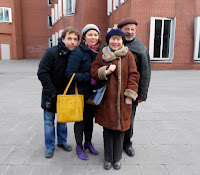MARRAKESH
When we lived in Beijing in the late nineties one of the more popular pastimes for expatriates was to shop at the Silk Market, a huge network of black market stalls selling all kinds of knock-off gear. Peter got quite expert at bargaining for items. He could spout prices in Mandarian as fast as the shopkeepers themselves. I remember when we bought “North Face” jackets for Lily and Abby. The shopkeeper demonstrated that they were waterproof by using a garden hose to splash water over them. The first jacket streamed water inside it but the second and third remained dry so we bought them. Even with compromised quality those jackets fit the girls for several years including hand me downs.
When we lived in Beijing in the late nineties one of the more popular pastimes for expatriates was to shop at the Silk Market, a huge network of black market stalls selling all kinds of knock-off gear. Peter got quite expert at bargaining for items. He could spout prices in Mandarian as fast as the shopkeepers themselves. I remember when we bought “North Face” jackets for Lily and Abby. The shopkeeper demonstrated that they were waterproof by using a garden hose to splash water over them. The first jacket streamed water inside it but the second and third remained dry so we bought them. Even with compromised quality those jackets fit the girls for several years including hand me downs.
So when we arrived in Marrakesh, a city famous for its “souks” or markets, I was ready to shop with Peter as our head bargainer. The problem is that I am often a liability to his shopping. Peter loves the thrill of the chase. He doesn’t care if he actually buys an item; he often wants to test how far down he can make the seller go. I get nervous and cave in or give up and walk away—not “reluctantly” coming back as Peter does for one of his successful tactics. The shop owners in the souk are notorious for overcharging for goods of low value.
During the afternoon of our city walking tour, our guide led us to some “special” stalls where he said we could find quality items. (He told us this over lunch at a restaurant where he was obviously getting a special deal—his meal was free since he had brought a group of foreign tourists there.) Lily, Abby and I all wanted earrings, and I wanted some Moroccan leather slippers. Our guide took us to a large shop crammed full with all kinds of antique looking vases, carvings, lamps, wooden furniture. . . There were several alcoves with jewelry displays. The shop owners were asking exorbitant prices. My first mistake was to cut Peter short in bargaining for an antique bowl I knew neither he nor I wanted. There went his credibility at that shop. At another stall, we tried getting a volume discount by selecting several pairs of earrings. The shopkeeper wouldn’t come down at all on his prices. Our guide hastily scribbled a price on a scrap of paper that he said the seller would accept, and then scratched it out so the seller wouldn’t see. Our guide was clearly on our side—NOT.

Finally, Peter had good success buying some earrings at another stall while I tried to bargain for a silver framed mirror as a surprise for Lily at the stall next door. The earrings were purchased and we began to walk over to the slipper stall when our guide kept asking me insistently—did I get a good price for the mirror? There went my surprise Christmas gift. At the slipper stall the same scenario played out as at the second jewelry shop. Our guide “helped” us determine the best price to offer. I did end up with some lovely slim, floral designed slippers—though when I checked the price at the airport shop when we were waiting for our flight to Madrid I discovered the shopkeeper and our guide had skunked us after all.
Beth



